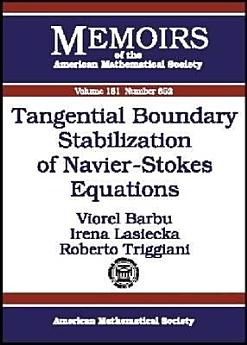Tangential Boundary Stabilization of Navier-Stokes Equations: Volume 181, Issue 852
Viorel Barbu · Irena Lasiecka · Roberto Triggiani
yan 2006 · American Mathematical Soc.
E-book
128
Pages
reportLes notes et avis ne sont pas vérifiés. En savoir plus
À propos de cet e-book
The steady-state solutions to Navier-Stokes equations on a bounded domain $\Omega \subset Rd$, $d = 2,3$, are locally exponentially stabilizable by a boundary closed-loop feedback controller, acting tangentially on the boundary $\partial \Omega$, in the Dirichlet boundary conditions. The greatest challenge arises from a combination between the control as acting on the boundary and the dimensionality $d=3$. If $d=3$, the non-linearity imposes and dictates the requirement thatstabilization must occur in the space $(H{\tfrac{3 {2 +\epsilon (\Omega))3$, $\epsilon > 0$, a high topological level. A first implication thereof is that, due to compatibility conditions that now come into play, for $d=3$, the boundary feedback stabilizing controller must be infinite dimensional. Moreover,it generally acts on the entire boundary $\partial \Omega$. Instead, for $d=2$, where the topological level for stabilization is $(H{\tfrac{3 {2 -\epsilon (\Omega))2$, the boundary feedback stabilizing controller can be In order to inject dissipation as to force local exponential stabilization of the steady-state solutions, an Optimal Control Problem (OCP) with a quadratic cost functional over an infinite time-horizon is introduced for the linearized N-S equations. As a result, the sameRiccati-based, optimal boundary feedback controller which is obtained in the linearized OCP is then selected and implemented also on the full N-S system. For $d=3$, the OCP falls definitely outside the boundaries of established optimal control theory for parabolic systems with boundary controls, in that thecombined index of unboundedness--between the unboundedness of the boundary control operator and the unboundedness of the penalization or observation operator--is strictly larger than $\tfrac{3 {2 $, as expressed in terms of fractional powers of the free-dynamics operator. In contrast, established (and rich) optimal control theory [L-T.2] of boundary control parabolic problems and corresponding algebraic Riccati theory requires a
Donner une note à cet e-book
Dites-nous ce que vous en pensez.
Informations sur la lecture
Smartphones et tablettes
Installez l'application Google Play Livres pour Android et iPad ou iPhone. Elle se synchronise automatiquement avec votre compte et vous permet de lire des livres en ligne ou hors connexion, où que vous soyez.
Ordinateurs portables et de bureau
Vous pouvez écouter les livres audio achetés sur Google Play à l'aide du navigateur Web de votre ordinateur.
Liseuses et autres appareils
Pour lire sur des appareils e-Ink, comme les liseuses Kobo, vous devez télécharger un fichier et le transférer sur l'appareil en question. Suivez les instructions détaillées du Centre d'aide pour transférer les fichiers sur les liseuses compatibles.




